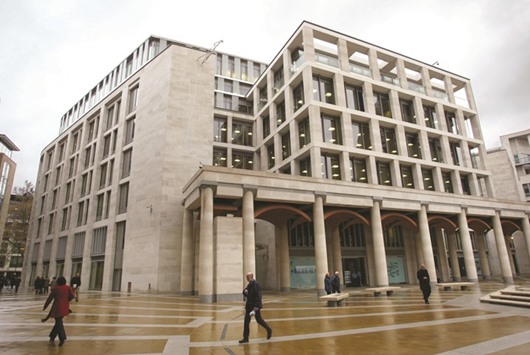Even as the UK stock market’s resurgence this year has made it among the most expensive in Europe, its smaller members are trading at multi-year lows. One reason? Concern over the UK secession.
With only six weeks to go before Britain votes on whether to remain in the European Union, the FTSE 250 Index of mid-sized companies is trading at its lowest level since 2010 relative to the FTSE 100 Index, with members of the FTSE SmallCap Index valued near a four-year low versus the large-cap gauge.
While some polls indicate the June 23 referendum is too close to call, the Bank of England has put the risk of a Brexit at the top of its list of near-term threats to the domestic economy. The National Institute of Economic and Social Research has also warned of a potential tumble in sterling that would damage growth prospects.
If voters choose to leave, smaller companies that do the bulk of their business in the UK could suffer most from a weaker economy, according to Smith & Williamson Investment Management’s Mark Boucher.
“Small and mid-caps have a much larger exposure to the UK earnings stream than the large caps stocks which are more international,” said Boucher, a London based fund manager at the firm, which overseas about £16bn ($23bn). “So, if there is any risk of Brexit, it will be reflected more in these stocks.”
The FTSE 100 has fallen just 2.3% this year compared with the Stoxx Europe 600 Index’s 9.4% drop, as miners and energy producers surged on rising commodity prices, and the pound weakened.
The FTSE 250 is down 4.6% and the FTSE SmallCap Index has fallen 1.3%. Even after a rebound in the past month, the pound is still the worst performer in 2016 among Group-of-10 nations, weighed down by poor economic data and concern that leaving the EU will damp investment.
Among companies that could lose out from domestic weakness is Hill & Smith Holdings, the heaviest weighted member of the FTSE SmallCap Index, which generates 50% of its revenue in the UK. On the FTSE 250, paper company DS Smith and Rightmove also count the UK as their single-biggest market.
Prime Minister David Cameron and Chancellor of the Exchequer George Osborne have warned that the UK would be worse off outside the EU.
They face high-profile opponents, including former London mayor Boris Johnson, who are campaigning for an exit from the world’s largest single market, underscoring a split in the ruling Conservative party. US President Barack Obama is among international leaders to have urged the UK to stay in the bloc.
As the referendum approaches, a report yesterday added to the gloom gathering about the UK’s economy - industrial production grew less in March than forecast as manufacturing barely rose and oil and gas output shrank.
Data on construction and services industries last week also missed economists’ forecasts.
The UK economy is forecast to grow 1.9% this year, which would be slowest pace since 2012.
“There is certainly a weakening of the UK economy which is partly a function of Brexit risk and will hurt smaller companies more than larger ones,” said Guy Foster, the head of research at Brewin Dolphin in London. “These cheap valuations in small and mid-caps are likely to sustain in the run up to June 23 and beyond.”

The headquarters of the London Stock Exchange. The FTSE 250 Index of mid-sized companies is trading at its lowest level since 2010 relative to the FTSE 100 Index, with members of the FTSE SmallCap Index valued near a four-year low versus the large-cap gauge.
